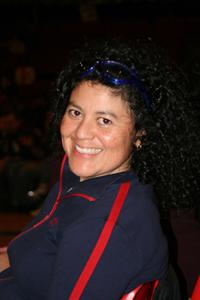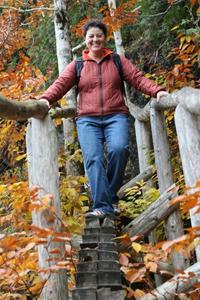Meet EPA Scientist Carolina Peñalva-Arana, Ph.D.

EPA scientist Carolina Peñalva-Arana, Ph.D., researches how to use molecular data to determine the health of an ecosystem. She and her colleagues are observing these tiny changes in ecosystem health to predict when an ecosystem is impaired earlier than ever before.
How does your science matter?
My colleagues and I are studying how macroinvertebrates—tiny animals you can’t see without magnification— and all possible organisms can be used to get a better understanding of ecosystem health.
Last summer we went out in the Little Miami watershed outside Cincinnati, OH and collected water samples and macroinvertebrates. We took our samples back to the lab and are now using DNA profiles from each site – in other words using genomic fingerprints of the organisms present at each location - to learn more about the local biodiversity and the genetic variation between key species.
This research will give us a greater understanding of the environment and the complex relationships of organisms living there. It’s possible we can use the presence or absence of these macroinvertebrates (another species identified through genomic means) to learn about the water quality and environmental health of an area. By having a more comprehensive dataset, we are more aware of when there are changes in the health of an ecosystem and where those changes occur.
If you could have dinner with any scientist, past or present, who would you choose and what would you like to ask him or her?
I would like to meet Rosalind Franklin and thank her for her work on uncovering DNA as a double helix structure. She never gets enough recognition for her research and excellent work, and I would like to sit down and praise her for it and let her know everyone knows she was very valuable to this great discovery. Then I would just like to hear what it was like to be a woman scientist at that time and what her thoughts were on her research.
What do you like most about your research?
Everything right now is in the discovery phase so it is very exciting to be looking at all of this data and being at the forefront of some of these ideas. It's great to have the support of my colleagues and the freedom to explore new ideas that can have an impact on protecting the environment.

When did you first know you wanted to be a scientist?
I've always been curious about the world around me. I was ten years old when I received a chemistry set and I remember asking for a microscope for my birthday. When I was in college, I had my first research experience over the summer and fell in love with all the possibilities it presented. I knew I wanted to do scientific research from then on and make a career out of it.
If you were not a scientist, what do you think you would be doing?
I would be a carpenter and designer or anything that involves working with your hands. Woodworking is a hard hobby to maintain when you are renting an apartment, but my wife and I recently bought a house and I've slowly been filling up our garage with my carpentry and carving tools.
Tell us about your background.
I was born in El Salvador and came to the US as a political refugee at the age of thirteen. As an undergraduate, I went to Oberlin College and received bachelor's degrees in Biology and Spanish Literacy. After that, I worked as a research assistant in the San Francisco Bay area for three years before continuing my graduate education at the University of Wisconsin studying Toxicology and Animal Behavior. I did my post-doc at Indiana University, looking at genes responsible for how invertebrates smell and taste things in water.
Any advice for student considering a career in science?
I would highly encourage them to get experience in a lab before starting a Masters or Ph.D. program. It's very important for everyone to see the amount of work that goes into research, including finding funding to pursue work that interests you. You have to be able to express to others why the work you are doing is important, which at times requires more writing than lab work. Getting research experience before grad school is a must. As an undergraduate, find a graduate student or post-doc who needs help in their lab. It's the easiest and best way to guarantee lots of hand-on experience.
Editor's Note: The opinions expressed herein are those of the researcher alone. EPA does not endorse the opinions or positions expressed.
